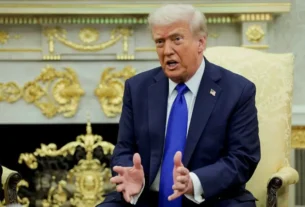In a surprising shift, U.S. President Donald Trump has appeared to ease his position on the administration’s stringent H-1B visa reforms, admitting that America must continue to attract highly skilled foreign professionals to remain competitive in critical sectors like manufacturing, technology, and defense.
During a Fox News interview with Laura Ingraham on Tuesday, Trump defended the importance of importing specialized talent, stating that the U.S. cannot simply rely on its long-term unemployed citizens to fill highly technical roles without substantial training.
“I agree, but you also have to bring this talent,” Trump said, stressing that while he supports raising wages for American workers, specialized industries demand specific expertise that the local workforce may not yet possess.
Trump’s remarks come weeks after he signed a proclamation in September that significantly increased H-1B visa application fees—from approximately USD 1,500 to USD 100,000—for new petitions filed after September 21. The U.S. State Department later clarified that this change would apply only to new applications or entries in the 2026 H-1B lottery, leaving existing visa holders unaffected.
Addressing critics who argue that America already has sufficient homegrown talent, Trump countered, “No, you don’t. There are certain skills you don’t have, and people have to learn them. You can’t take people off the unemployment line and say, ‘I’m going to put you into a factory where we’re going to make missiles.’”
He highlighted an example from Georgia, where the removal of skilled South Korean workers caused disruptions in advanced battery manufacturing at a Hyundai plant, underscoring the complexity and danger of such production processes.
“They had people from South Korea who had made batteries all their life. Making batteries is complicated and dangerous—there were explosions and other issues. You can’t replace that expertise overnight,” he added.
Trump’s comments represent a notable pivot from his earlier hardline immigration policies. This acknowledgment suggests that while his administration aims to prioritize American workers, it now recognizes that global expertise is essential for sustaining the nation’s industrial and technological strength.
As the U.S. navigates its economic future, this new tone from the President may mark the beginning of a more balanced approach — one that values both domestic employment and the invaluable contribution of international talent.





